|
"We're being
slaughtered. I don't believe in fighting for glory if it won't accomplish
anything. It looks like we'll have to pack it in."
Col. George Descheneaux, 422nd Infantry Regiment Commander, December 19,
1944
George L. Descheneaux was born December 30, 1908. He graduated from the US
Military Academy at West Point in 1932, and the Infantry School at Fort
Benning, Ga. in 1937.
During 1940-42 he was with the 6th Division, serving, in turn, as a
company commander, battalion executive officer, battalion commander, and
regimental plans and training officer of the 3rd Infantry Regt. While with
the 6th Division, he also held the post of assistant adjutant general.
Col. Descheneaux was with the 5th Army in 1943 as a War Department
observer, serving as liaison officer between the 5th Army Headquarters and
the front line divisions in Italy.
After a short period as assistant G-3 of the 2nd Army Headquarters, Col.
Descheneaux was assigned to the 106th Division as assistant chief of staff
in charge of the G-3 section shortly before the division was activated.
Descheneaux assumed command of the 422nd Infantry Regiment, 106th Infantry
Division, in July 1944.
"Much of combat action in this war is made up of semi-independent, and
often isolated operations on the part of small units. A great deal depends
on how well these units function. I am convinced that the greatest stress
should be placed on individual and small unit training and on the
development of small unit leaders."
-Col Descheneaux, upon receiving command of the 422nd IR, July 1944
The 106th Infantry Division arrived in the ETO in early December 1944, and
replaced the 2nd Infantry Division in the Schnee Eifel sector of Belgium
on December 11.
On December 16, 1944, in a quiet sector in the Ardennes forest, the
Germans launched a major counter offensive which would become known as The
Battle Of the Bulge. Fighting on throughout the day and night, many
elements of the American army found themselves surrounded by superior
German infantry and armored troops. By December 17th the 422nd Infantry
Regiment under Col. Descheneaux and the 423rd IR (Col. Cavender) were
completely surrounded.
After an abortive attempt to break out of their encirclement at the
village of Schoenberg, both Descheneaux and Cavender had decided that
further resistance was futile.
"I'm going to save as many men as I can, and I don't give a damn if I'm
court-martialed," Descheneaux said. It was agreed that Lt. Col. Frederick
W. Nagel, the wounded executive officer of the 423rd, would negotiate for
both regiments, since he spoke German. The German lieutenant whom Nagel
brought back to the American lines with him could not speak English but
did speak French, a language Descheneaux understood, so the commander of
the 422nd himself worked out the details. By the afternoon of December 19,
Descheneaux and Cavender had surrendered their regiments- the largest mass
surrender of US troops in the ETO.
Descheneaux and the other members of the two regiments were taken
prisoner. Col. Descheneaux served as a POW in Stalag
XII-A and later in Stalag IX-B (corrected - See below) until
the end to the war. He retired from the Army in 1946, citing tuberculosis
contracted while he was a POW.
Col. George
Descheneaux died July 14, 1984.
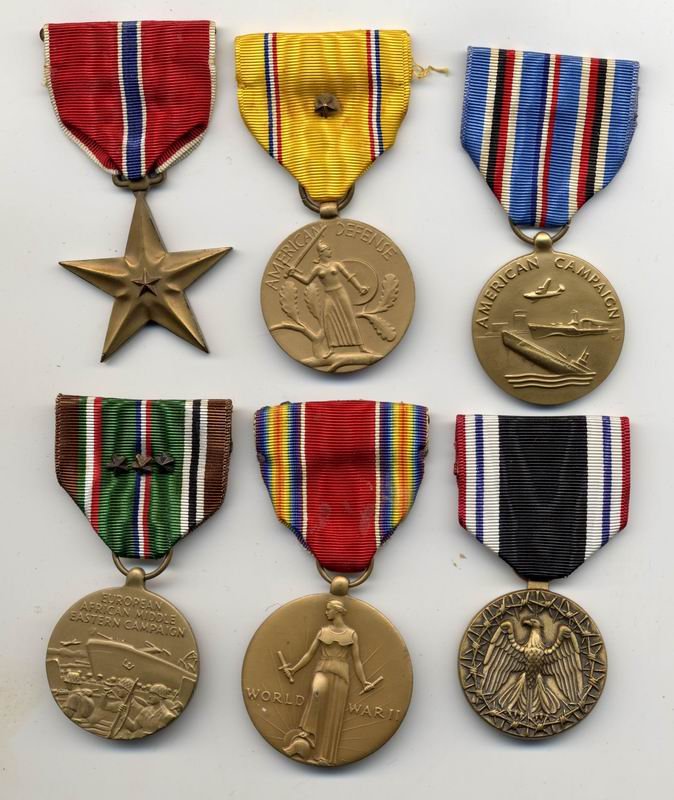
Col.
Descheneaux's medals, including Bronze Star, American Campaign,
American Defense, EAME Medal, World War II Victory medal, and POW
medal
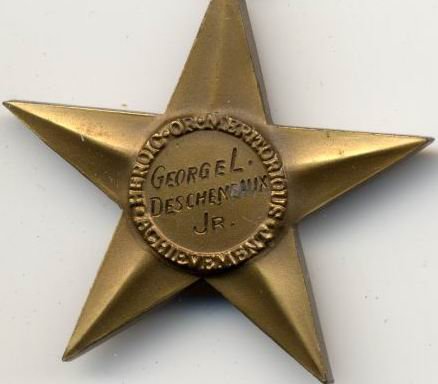
Col
Descheneaux's officially engraved Bronze Star
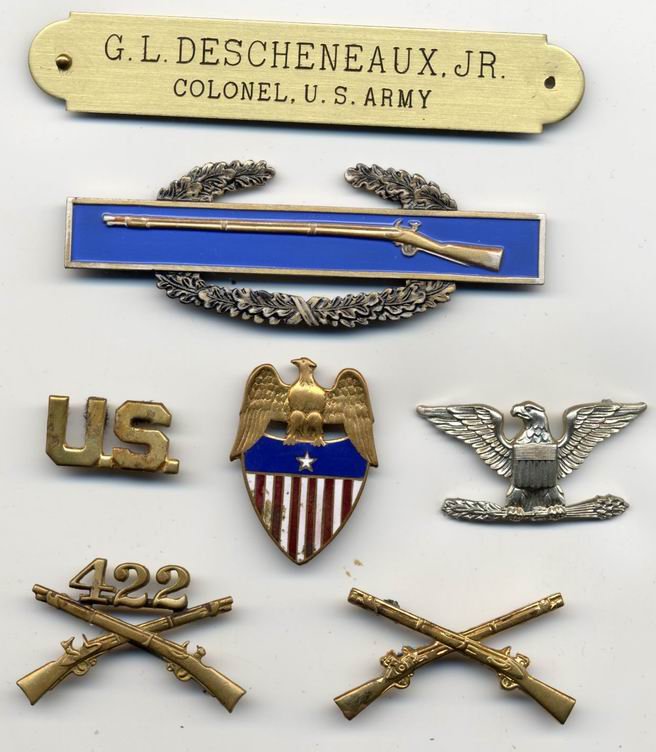
Combat Infantryman's Badge, collar brass, and nameplate from framed
display
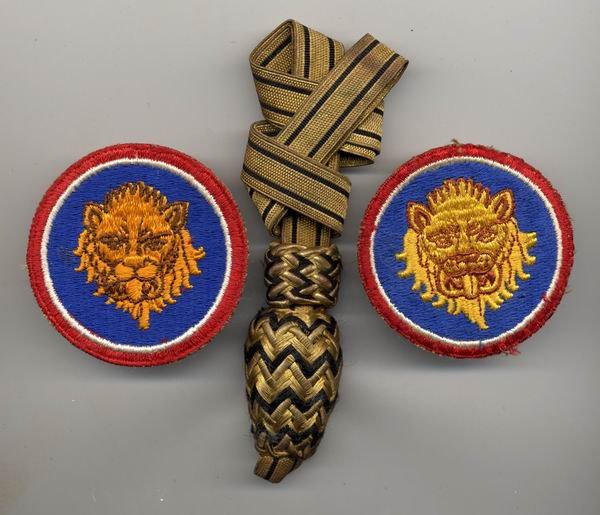
106th Division patches and sword knot.
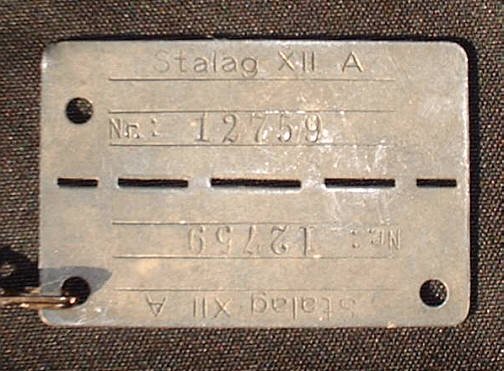
Col.
Descheneaux's Stalag XIIB POW dog tag.
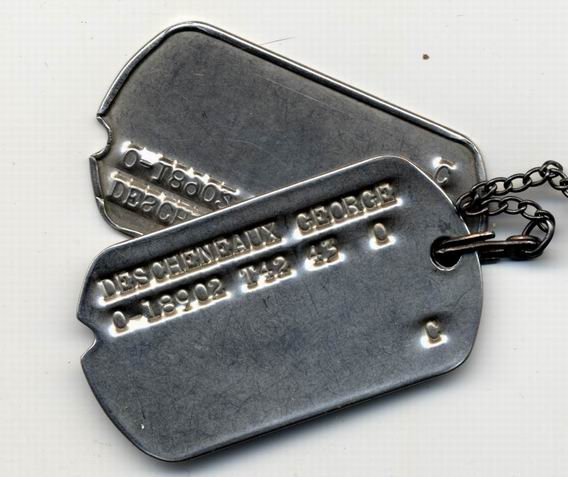
Col.
Descheneaux's American dog tags.
Source:
http://www.purplehearts.net/descheneaux/descheneaux.htm |
|
November
18, 2016
Mr. West,
I am the
grandson of George L. Descheneaux Jr. and was reviewing your web site.
Great site by the way. I enjoyed revisiting the history of the Golden
Lions.
From
time to time, I review any information on the internet, books etc. to
ensure the accuracy of his quotes, dates etc. As you might know, it is
frustrating to see misquotes in books, articles which takes an act of
congress to have them changed.
I
noticed in reviewing your POW section that my grandfather is mentioned
that he was in Stalag IIA, Limburg and Stalag IX-B, Bad Orb, POW camps.
My grandfather in transition to his final POW camp was housed at only
one Stalag’s and one Durlag and finally housed in Brunswick, Germany
(OFLAG-79) in accordance to his POW diary.
Here
is his journey after capture.
| 12/19/1944 |
Arrived at Schonberg, Germany |
| 12/20/1944 |
Arrived at Wittlick, Germany |
| 12/22/1944 |
Arrived at Koblenz, Germany |
| 12/22/1944 |
Arrived at Limburg, Germany (Stalag XIIA) |
| 01/02/1945 |
Arrived at Wetzlar-Durlag-Luft |
| 01/06/1945 |
Returned to Limburg, Germany (Stalag XIIA) |
| 01/18/1945 |
Left Limburg, Germany (Stalag XIIA) |
| 01/22/1945 |
Arrived Brunswick, Germany (OFLAG-79) |
| 04/12/1945 |
Liberated |
Thank
you!
Very
Respectfully,
James G.
Ormsby
Gunnery
Sergeant, USMC (Ret.) |






 Page last revised
11/18/2016
Page last revised
11/18/2016